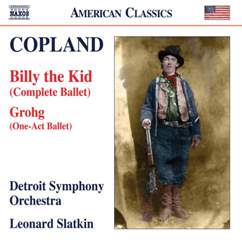Copland - Billy The Kid & Grohg (2019)
Copland - Billy The Kid & Grohg (2019)

Grohg 1. I. Introduction & Cortège - Entrance of Grohg 7:53 2. II. Dance of the Adolescent 6:19 3. III. Dance of the Opium-Eater (Visions of Jazz) 3:40 4. IV. Dance of the Street-Walker 4:31 5. V. Imagines the Dead Are Mocking Him 5:00 6. VI. Illumination and Disappearance of Grohg 2:13 Billy the Kid 7. I. Introduction. The Open Prairie 3:16 8. II. Street in a Frontier Town 3:17 9. III. Mexican Dance & Finale 7:07 10. IV. Prairie night (Card game at night) - Billy cheats Garrett at cards - They quarrel [3:39] 11. V. Gun battle - Billy is captured by Garrett, turned sheriff [2:34] 12. VIa. Celebration [3:00] 13. VIb. Billy in prison - Murder of the prison guard and escape [1:40] 14. VIc. Billy in the desert: Waltz [3:46] 15. VIIa. Billy's death [1:09] 16. VIIb. Billy's funeral: Mourning Mexicans [1:24] 17. VIII. The open prairie again [2:21] Detroit Symphony Orchestra Leonard Slatkin - conductor
Aaron Copland did as much as anyone in establishing American concert music on the world stage, and his ballet scores proved to be among his most important and influential works. Grohg is the most ambitious example of his Parisian years, a precociously brilliant one-act ballet scored for full orchestra, inspired by the silent expressionist film Nosferatu. The first example of Copland’s new ‘Americanized’ music of the 1930s was Billy the Kid, based on the life of the 19th century outlaw and heard here in its full version. This was the first fully fledged American ballet in style and content: brassy, syncopated, filmic and richly folk-flavoured. ---prestomusic.com
Since becoming conductor of the Detroit Symphony Orchestra, Leonard Slatkin has issued a variety of recordings. He has been able to call the shots as to repertory, and the results have generally been worthwhile. With this Copland release he and the orchestra have outdone themselves. Copland has always been one of Slatkin's specialties; he gets the peculiarly American mix of broadness and subtlety in the composer's music, and his readings of the big ballets are as fine as any on the market. Here you get the complete Billy the Kid, less often heard than the familiar Suite, and containing the solitary "Billy in the Desert" to match the card game nocturne, both hypnotically done. The real news here, however, is Grohg, written in 1925 at the suggestion of Copland's teacher, Nadia Boulanger, performed once in 1932, and then abandoned until the early 1990s. Performances are rare, but Slatkin's reading is good enough to change that. Having been given the task of writing a ballet and having recently seen the film Nosferatu, Copland asked the director Harold Clurman for a scenario, received a surreal tale in which the titular sorcerer animates a variety of personalities, and went to town with a score that reflects various fashions of the 1920s. There is a bit of jazz (paired, significantly, with the sorcerer's revived opium addict), some highly dissonant passages, perhaps even a bit of twisted-up Grieg. And yet, all of it somehow sounds like Copland, and there are foreshadowings aplenty of his mature style. Copland himself thought enough of the music to reuse some of it in his Symphony No. 2 ("Short Symphony"), and you couldn't ask for a better combination than Slatkin and the Detroiters in bringing out his personality in the music. Highly recommended. ---James Mannheim, AllMusic Review
download (mp3 @320 kbs):
yandex mediafire ulozto gett bayfiles








